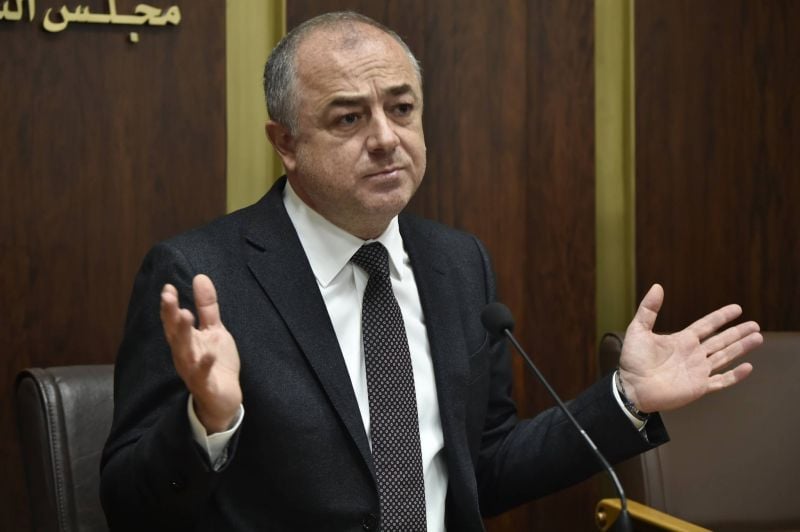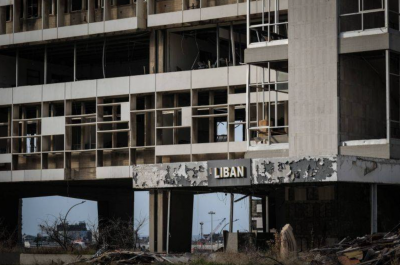
Deputy Parliament Speaker Elias Bou Saab, April 12, 2023. (Credit: Hussam Shbaro)
BEIRUT — Parliament’s joint committees held a contentious session on Wednesday, when MPs reacted to the caretaker cabinet’s April 18 move to increase public sector salaries and transportation allowances and pensions.
The session witnessed a “violent verbal altercation” between MPs Ali Hassan Khalil (South III/Amal) and Michel Moawad (North III/Ind.), according to the state-run National News Agency (NNA). Al Jadeed reported that the screaming could be heard from the nearby pressroom outside the committee’s chambers.
The altercation was reportedly about the constitutionality of the caretaker cabinet’s decrees after the cabinet asked Parliament to open budget appropriations to pay for them. In a statement issued after the session and reported by the NNA, Moawad called the moves unconstitutional.
The topic of the pay raises and transportation allowance increases entered the agenda seemingly last-minute via the addition of two draft laws proposed by the cabinet to open budget appropriations to pay for the pay bonuses and transportation allowances.
“If they want to increase salaries without securing revenue, this will increase the state of collapse and depositors will be used to calm down what is left and to artificially preserve the dollar,” said Moawad.
He added that “real reforms” are needed and the state’s duty towards public sector workers, “who have paid the price of the collapse alongside depositors,” must be dealt with “in the right way.”
Khalil issued a separate statement after the session: “It is our national responsibility to ensure the minimum level of regularity in the work of state administrations,” he said, adding that “we insist it is the duty of this government to propose projects.”
The April 18 decrees from the caretaker government gave most civilian public sector workers a bonus equal to four times their base salary— the first major increase since the 2022 budget law was passed last November.
In a statement after the session, Deputy Speaker Elias Bou Saab (Mt Lebanon II/FPM) said “We discussed the government's projects related to employee salaries and transportation allowances. There is a difference of opinion.”
“Politically, there are those who consider that the government is not entitled to send projects because it is a caretaker government, and some who believe the opposite,” added Bou Saab, as reported by the NNA.
Meetings of the caretaker cabinet, and decisions issued by it, remain politically contentious. Some parties, notably the Free Patriotic Movement, argue that such meetings are unconstitutional during the presidential vacuum.
In November 2022, Parliament granted the caretaker cabinet permission to meet under exceptional circumstances, although the exact boundaries of that mandate remain unclear.
In the April 18 session, the cabinet passed 100 decrees. Most of these were routine business but some, like public sector pay, could have important consequences for hundreds of thousands of people.
Bou Saab on Wednesday suggested a workaround to the constitutional impasse by reintroducing versions of the recent decrees as draft laws to be passed by Parliament. According to Moawad’s statement, such draft laws could come from MP Ibrahim Kanaan (Mt Lebanon II/FPM).
This could lead to a different constitutional morass, however, as Parliament is theoretically restricted from engaging in substantive legislation in the general assembly until it elects a president.
This principle may be flexible, however, as witnessed in a Tuesday Constitutional Council ruling on the law delaying municipal elections for one year.
According to Constitutional Council member Mireille Najm, the council’s majority “gave precedence to the principle of the continuity of public services.”
That is, without the postponement, there could be a risk of municipal council vacancies and a consequent interruption in handling municipal business. Forces of Change MP Paula Yacoubian (Beirut I) described the decision as “distressing.”
The joint committees will reconvene with the same agenda next week, Bou Saab said, with the possible addition of draft laws related to public sector pay and transportation allowances.
